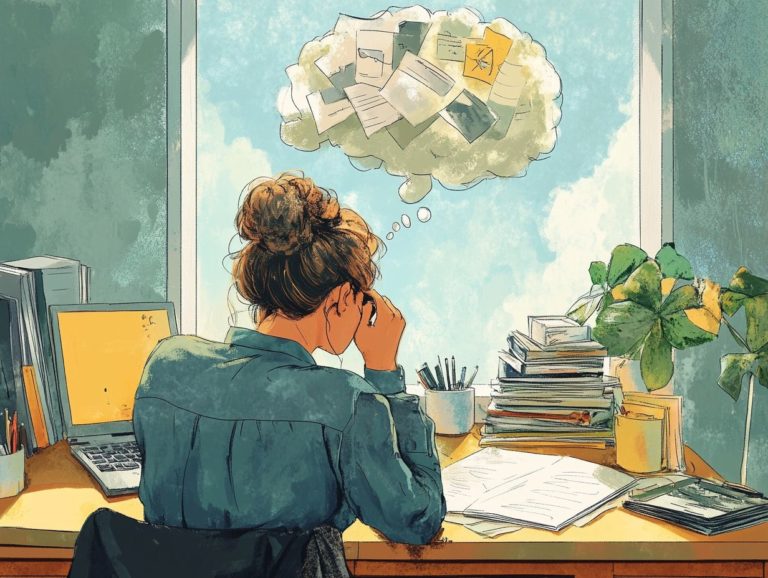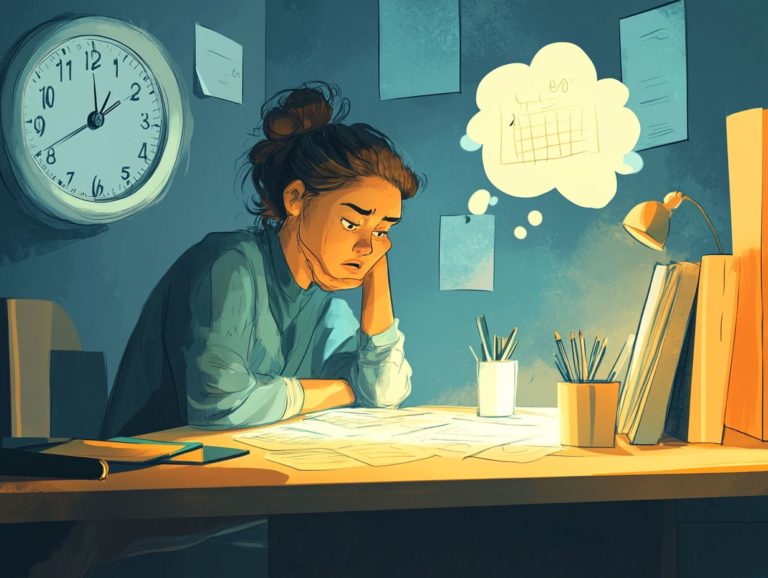The Role of Self-Reflection in Reducing Procrastination
Procrastination can be a vexing challenge for many individuals, often rooted in deeper behavioral patterns that frequently escape notice.
This article delves into the definition of procrastination and its impact on your daily life. It highlights the importance of self-reflection as a key to overcoming it.
You ll discover practical techniques for weaving self-reflection into your routine. You ll also learn about the many benefits it offers and strategies to navigate common obstacles.
Get ready to boost your productivity and reduce stress!
Contents
- Key Takeaways:
- The Definition and Effects of Procrastination
- The Importance of Self-Reflection in Overcoming Procrastination
- Practical Ways to Incorporate Self-Reflection into Daily Routine
- Benefits of Consistent Self-Reflection for Reducing Procrastination
- Overcoming Common Challenges in Self-Reflection
- Frequently Asked Questions
- What is the role of self-reflection in reducing procrastination?
- How can self-reflection help you kick procrastination to the curb?
- Can self-reflection be used as a tool to prevent procrastination?
- Is self-reflection a magic fix for procrastination?
- What are some effective self-reflection techniques for reducing procrastination?
- Can self-reflection be combined with other strategies to reduce procrastination?
Key Takeaways:

- Self-reflection helps identify triggers and patterns of procrastination. This leads to a better understanding of the behavior and its consequences.
- Incorporating self-reflection techniques such as journaling and meditation into daily routines can help reduce procrastination and improve time management and productivity.
- Consistent self-reflection can lead to reduced stress and anxiety. It is an important tool in overcoming procrastination challenges.
The Definition and Effects of Procrastination
Procrastination is the tendency to delay or postpone tasks. It often creates a cycle of anxiety and stress that can significantly impact your academic performance and overall mental well-being.
This behavior may stem from various psychological triggers, including perfectionism and a fear of failure. Ultimately, this diminishes your productivity and fosters chronic procrastination habits.
Recognizing the effects of procrastination is essential for crafting effective strategies. These strategies enhance both your self-regulation and emotional regulation.
Understanding the Behavior and Its Consequences
Understanding procrastination requires delving into the underlying behavioral patterns and emotional responses that drive task avoidance. These responses are often fueled by a fear of failure and perfectionist tendencies.
This behavior typically emerges from a complex interplay of cognitive processes. Negative thoughts overshadow your belief in your own abilities and capabilities. As you become increasingly overwhelmed, emotional responses may manifest as anxiety and guilt, creating a cycle that perpetuates avoidance.
You might find yourself ensnared in a web of self-doubt. The pressure to meet high standards breeds feelings of inadequacy.
This pattern hampers your productivity. It can also take a significant toll on your mental health, contributing to stress, depression, and an overall decline in well-being.
The Importance of Self-Reflection in Overcoming Procrastination
Self-reflection is essential in conquering procrastination. It enables you to gain insight into your habits and the emotional and cognitive processes that prompt task avoidance, including understanding the role of sleep in reducing procrastination.
When you take the time to reflect on yourself, you can pinpoint the specific triggers that lead to procrastination. This awareness enables you to craft personalized strategies that boost your motivation and improve your task completion rates.
Embracing this practice can transform your approach to challenges. It turns potential roadblocks into stepping stones for success.
How Self-Reflection Can Help Identify Triggers and Patterns

Self-reflection is your secret weapon for uncovering procrastination triggers and patterns. It fosters emotional regulation and enhances awareness of procrastinating behaviors, especially when faced with task complexity and anxiety.
Through these introspective practices, you can pinpoint how certain emotions such as the fear of failure or overwhelming stress contribute to your tendency to avoid tasks. This insight is invaluable; recognizing these feelings enables you to adopt effective coping strategies that align with your emotional landscape.
For example, developing methods to manage anxiety or breaking tasks into smaller, more manageable steps can drastically enhance your productivity and task management.
By nurturing emotional regulation, self-reflection not only reveals hidden triggers but also lays the groundwork for a more focused and structured approach to conquering procrastination.
Practical Ways to Incorporate Self-Reflection into Daily Routine
Incorporating self-reflection into your daily routine can be seamlessly accomplished through practical methods like journaling and meditation. These helpful techniques are instrumental in managing your emotions and refining time management skills.
These techniques help you recognize when you procrastinate and enable you to develop ways to get motivated.
Journaling, Meditation, and Other Techniques
Journaling and meditation are exceptional techniques for self-reflection. They enhance how you think and make decisions, effectively combating procrastination through targeted motivation techniques.
Each practice offers distinct pathways for deepening your self-awareness. Journaling provides a safe haven where you can explore your thoughts and feelings without judgment, fostering clarity and understanding.
On the other hand, meditation cultivates mindfulness. It helps you remain present and focused, reducing the mental clutter that often leads to procrastination.
By consistently engaging in these mindful practices, you’ll notice a more balanced emotional state quickly, making it easier to approach tasks with a renewed sense of purpose. This powerful combination lays a solid foundation for effective procrastination strategies, enabling you to navigate daily challenges with greater ease.
Benefits of Consistent Self-Reflection for Reducing Procrastination
Engaging in consistent self-reflection offers a wealth of advantages for curbing procrastination. You’ll notice improvements in time management and productivity, along with enhanced emotional management.
This process also helps lower anxiety and stress levels, all of which play crucial roles in setting and achieving your goals more effectively.
Improved Time Management and Productivity

Through improved time management, self-reflection can significantly elevate your productivity, enabling you to cultivate effective procrastination strategies that enhance your task completion rates.
This practice invites you to assess how you utilize your time, helping you pinpoint patterns that may be impeding your efficiency.
By regularly evaluating your daily activities, you can uncover time-wasting habits and shift toward more productive routines.
Techniques such as journaling, where you track your tasks and reflect on their effectiveness, can be especially beneficial. Setting specific goals and breaking them down into manageable steps allows for clearer prioritization.
By weaving these reflective practices into your daily life, you can deepen your understanding of your work habits, leading to heightened focus and remarkable boosts in productivity.
Reduced Stress and Anxiety
Regular self-reflection can significantly reduce your stress and anxiety by enhancing your emotional management, which helps mitigate the negative effects of procrastination.
Reflecting on your thoughts helps you delve deeply into your feelings, enabling you to pinpoint the underlying triggers that contribute to your stress levels.
As you gain clarity about your emotional states, you can cultivate healthier coping mechanisms and enhance your overall mental well-being.
This heightened awareness allows you to break the cycle of avoidance that often fuels procrastination. By prioritizing self-reflection, you can experience a remarkable boost in your emotional resilience, paving the way for a more balanced and fulfilling life.
Overcoming Common Challenges in Self-Reflection
Navigating the common challenges of self-reflection, including resistance and negative thoughts, is crucial for cultivating a productive mindset.
By addressing these obstacles, you can hone effective motivation techniques that will help you conquer procrastination and unlock your full potential.
Begin your journey of self-reflection today for a more productive tomorrow!
Facing Resistance and Negative Thoughts
Facing resistance and negative thoughts during self-reflection is key to conquering procrastination! Effective management of your emotions can pave the way for a more constructive mindset.
By recognizing these inner obstacles, you can start to unravel the underlying beliefs that fuel your hesitation. Implementing strategies like mindfulness practices, journaling, and changing how you think about situations can significantly boost your ability to navigate these mental hurdles.
Emotional regulation techniques such as deep breathing exercises or visualization allow you to respond more balanced emotionally, granting you clarity in moments of self-doubt.
Nurturing self-awareness during these times transforms negative thoughts into growth opportunities, enabling you to embrace your reflections without unnecessary resistance.
Frequently Asked Questions

What is the role of self-reflection in reducing procrastination?
Self-reflection is the process of examining one’s thoughts, feelings, and behaviors. In the context of procrastination, it involves identifying the reasons for avoiding tasks and developing strategies to overcome them.
How can self-reflection help you kick procrastination to the curb?
Self-reflection allows individuals to gain a better understanding of themselves and their patterns of procrastination. By identifying and addressing the root causes, they can develop more effective strategies to manage their procrastination tendencies.
Can self-reflection be used as a tool to prevent procrastination?
Yes, self-reflection can be a powerful tool in preventing procrastination. By regularly reflecting on one’s thoughts and behaviors, individuals can become more aware of their procrastination patterns and take proactive steps to avoid them.
Is self-reflection a magic fix for procrastination?
No, self-reflection is an ongoing process and requires consistent effort. It is not a one-time solution for reducing procrastination, but rather a tool that individuals can use to continually improve their productivity.
What are some effective self-reflection techniques for reducing procrastination?
Some effective self-reflection techniques for reducing procrastination include journaling, talking to a trusted friend or mentor, and setting aside dedicated time for self-reflection. These techniques can help individuals gain insights into their procrastination habits and develop strategies to overcome them.
Can self-reflection be combined with other strategies to reduce procrastination?
Yes, self-reflection can be combined with other strategies such as goal-setting, time management, and seeking accountability to reduce procrastination. By using a combination of techniques, individuals can develop a personalized approach to managing their procrastination tendencies.






